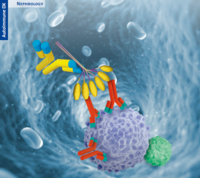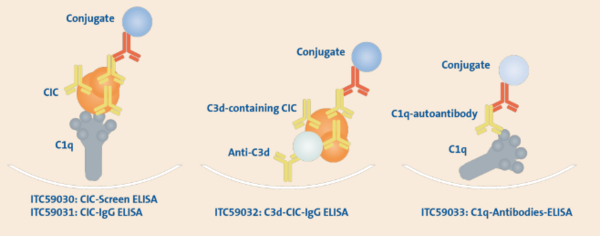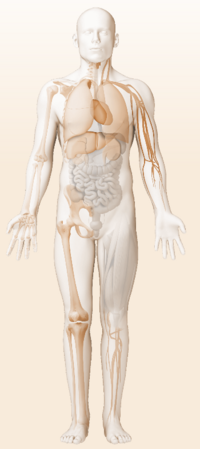 The complement system is part of the innate immune system. Its main function is the detection and elimination of pathogens.
The complement system is part of the innate immune system. Its main function is the detection and elimination of pathogens.
Complement activity also plays an important role in the pathogenesis of systemic autoimmune diseases. It is activated, among others, by circulating immune complexes (CIC) in the bloodstream. These circulating immune complexes (CIC) are aggregates (aggregations) of antibodies and structures dissolved in the blood against which these antibodies are directed (antigen - antibody complexes).

 Normally, immune complexes are taken up by phagocytes or macrophages immediately after their formation. However, if too many immune complexes are produced, this exceeds the capacity of the phagocytes and the immune complexes can enter the blood in larger quantities.
Normally, immune complexes are taken up by phagocytes or macrophages immediately after their formation. However, if too many immune complexes are produced, this exceeds the capacity of the phagocytes and the immune complexes can enter the blood in larger quantities.
Subsequently, immune complexes can be deposited in blood vessels (such as those of the kidney) and lead to severe inflammatory reactions (vasculitis) and organ damage. Particularly affected by deposits in the microvessels are the following organs: kidney, lung, heart, joints and skin.
In complement activation, fission products such as C3d can be detected in patients with lupus nephritis or in patients with cutaneous systemic scleroderma.
There are different types of immune complexes depending on which antibodies and antigens are included:
• Immune complexes with antibodies of the type IgG, IgA, IgM,
• Immune complexes with complement factors (C1q, C3c, etc.).
Patients with systemic autoimmune disease may also develop antibodies to components of the complement cascade. One of the important components targeted is C1q.
Anti-C1Q autoantibodies are indicative of lupus nephritis, but can also be found in other diseases and inflammatory diseases.

Elevated levels of circulating immune complexes can be found in:
• Autoimmune diseases (SLE, vasculitis, Sjörgen syndrome, rheumatoid arthritis, spondylitis, scleroderma)
• Bacterial, viral and parasitic infectious diseases
• Kidney disease (glomerulonephritis, after kidney transplants)
• Hematologic and neoplastic diseases (leukemia, lymphoma)
In autoimmune diseases, the detection of circulating immune complexes is an important criterion for the assessment of disease activity and organ manifestations as well as for the indication of new therapeutic procedures.
HUMAN autoimmune diagnostic assays combine technology and science
• C1q molecules are bound to the surface of ELISA using patented technologies
• Ensure the preservation of epitopes for the anti-C1q Antibodies ELISA
• Ensuring biological activity for the CIC-IgG ELISA
• Special sample dilution buffer ensures exclusive detection of C1q autoantibodies.
• The combination of CIC-IgG and C3d-CIC ELISA technologies helps distinguish different complement activation pathways
Products
Circulating Immune Complexes
ELISA
Determination of complement activity
| Acceptor | REF | Size |
| IgM (complement activator) | IMTTC 590315 | 96 Tests |
Quantitative determination of IgG antibodies to C1q circulating immune complexes.
Calibration: 25 / 50 / 100 / 400 µg/ml
Cut-off: 55 µg/ml
| Acceptor | REF | Size |
| C1q-CIC | IMTTC 59031 | 96 Tests |
Quantitative determination of IgG antibodies to C3d circulating immune complexes.
Calibration: 25 / 50 / 100 / 200 µg/ml
Cut-off: 40 µg/ml
| Acceptor | REF | Size |
| Anti-C3d-CIC | IMTTC 59032 | 96 Tests |
For further information please contact one of our responsible contact persons. We are happy to help!

 Deutsch
Deutsch



